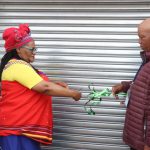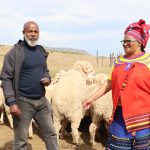Joint government investment to bolster primary wool producers
The investment by the Eastern Cape Department of Rural Development and Agrarian Reform and the Chris Hani District Municipality in primary wool production in Embekweni Village outside Whittlesea is expected to bring sustainability to local wool growers.
On Thursday [April 20, 2023] MEC for Rural Development and Agrarian Reform, Nonkqubela Pieters officially handed over a fully-fledged sheep shearing shed to Embekweni woolgrowers for use while on the same day the Chris Hani District Municipality handed over 100 rams of Dohne Merino sheep to improve the quality of clip produced by communal farmers across the district.
Chris Hani District Municipality is the province’s top wool producer. A total of 20 293 bales of wool were produced in the five districts of the Eastern Cape in the year 2022. The clip was gathered from 1 202 shearing sheds with the Chris Hani District being the biggest contributor with 457 sheds that produced 7079 bales.
Embekweni woolgrowers are an affiliate of Mgijima Woolgrowers Association under the Chris Hani Woolgrowers Association. The local growers boast with a flock of 3522 sheep that belong to its 83 members whom 31 of are women.
In the past year, they banked over R1.2 million from sale of 83 bales off of their wool clip.
Their wool clip is sheared off the sheep, sorted, packed and transported to a Gqeberha-based agent who then sells it to international markets.
According to the chairperson of the Enoch Mgijima Woolgrowers Association Siyambonga Booi, the intergovernmental investment is bound to strengthen primary production in the district.
“Emerging producers, especially those from previously disadvantaged backgrounds aren’t participating meaningfully in wool production and this is all attributed to wool quality. Our counterparts sell 1kg of wool for R300 while majority of emerging black growers sell 1kg between R150 and R200. This has nothing to do with race. It is a matter of quality,” said Booi.
Booi acknowledged that government investment in wool production through the construction of shearing sheds and livestock improvement programmes has professionalized a large number of previously marginalized groups.
“In the past livestock farming used to be a men’s field in rural areas but because we’ve been made to realise its commercial value, it has become a source of living even in women-led households,” he said.
Nosakhele Feni is one of the group of women who are founding members of Embekweni Woolgrowers who started with two sheep but now has a flock of 132 sheep.
“I am a mother of 8 and none of them is working. The sheep have become our main source of income from selling their wool to selling the actual sheep. Ukulima bubomi [Farming is life,” Feni stressed.
Embekweni Woolgrowers came into existence in 1976 but all the years they had been operating on informal structures until the year 2007 when the members decided to finance a construction of a better structure from their savings.
However, even the one they had built on their own could not help them produce to their full potential.
During the 2018/19 financial year, their application for infrastructural support was approved by the Eastern Cape Department of Rural Development and Agrarian Reform and R1.1 million was invested in the construction of the shearing shed.
The Eastern Cape Department of Rural Development and Agrarian Reform continues to invest strategically in both livestock and wool production.
In her 2023/24 fiscal year budget speech, MEC Pieters committed an amount of R42.5 million towards livestock production, construction of multipurpose sheds and other relevant infrastructure.
Pieters said the firming of primary wool production presented an investment opportunity for secondary role players in the industry.
“Now that your government has catapulted you to a professional level of wool producers a gap for processing has been opened. DRDAR alone cannot finance every economic development programme in the agricultural sector. It is for this reason that we work hand in glove with the private sector and other role players to create more opportunities and add value to our primary and raw products,” she said.
She further committed that the department would swiftly engage the national department of Water and Sanitation to address hindrances around the provision of water in the Embekweni area.
“The stock dams that are said to be silted will also be attended to. This has been budgeted for,” she said.



